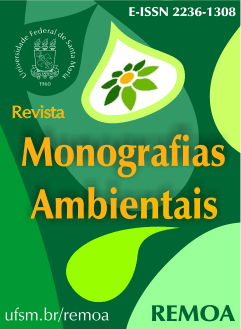Seguro de responsabilidad civil por daño medioambiental en España
DOI:
https://doi.org/10.5902/2236130810959Keywords:
Garantía, Ley, Medio ambiente, ReparaciónAbstract
En este trabajo se analiza el seguro de responsabilidad civil por el daño medioambiental en España. Para ello, se analiza la Directiva 2004/35/CE del Parlamento Europeo y del Consejo juntamente con la ley de responsabilidad civil medioambiental de España. Luego, se expone el concepto de seguro de responsabilidad civil y la estructura de la póliza de seguro. Y, finalmente se formulan unas breves consideraciones y las conclusiones.
Downloads
References
CALZADA CONDE, M. Á. El seguro de responsabilidad civil. Navarra: Aranzadi. 2005. 155 pp.
ESPAÑA. Directiva 2004/35/CE del Parlamento Europeo y del Consejo, de 21 de abril de 2004. Disponible en: http://eur-lex.europa.eu/LexUriServ/LexUriServ.do?uri=OJ:L:2004:143:0056:0075:es:PDF. Acceso en: 30 abr. 2012.
ESPAÑA. Noticias Jurídicas. Base de datos de legislación, Ley 50/1980, de 8 de octubre. Disponible en: http://noticias.juridicas.com/base_datos/Privado/l50-1980.html. Acceso en: 20 may. 2012.
ESPAÑA. Noticias Jurídicas. Base de datos de legislación, Ley 26/2007, de 23 de octubre. Disponible en: <http://noticias.juridicas.com/base_datos/Admin/l26-2007.html. Acceso en: 30 abr. 2012.
ESPAÑA. Noticias Jurídicas. Base de datos de legislación, Real Decreto Legislativo 6/2004, de 29
de octubre. Disponible en: http://noticias.juridicas.com/base_datos/Privado/rdleg6-2004.html. Acceso en: 30 may. 2012.
HARTEN FILHO, C. A. El deber de declaración del riesgo en el contrato de seguro, exposición crítica del modelo brasileño y estudio del derecho comparado. Salamanca: Ratio Legis. 2007. 153 pp.
HEBRERO ÁLVAREZ, J. I. El aseguramiento de la responsabilidad civil por daños al medio ambiente. Madrid: Dykinson. 2002. 305 pp.
LÚCIA PORCIONATO, A.; MENDES LOBO, A. A vez do seguro ambiental: o fomento às novas coberturas pelas inovações da lei complementar n° 126, de 16.01.2007. Revista IOB de Direito Civil e Processual Civil, Porto Alegre, Síntese. 2007. p. 46-91.
LOZANO CUTANDA, B. (Coord.). Comentarios a la ley de responsabilidad medio ambiental. Pamplona: Aranzadi. 2008. 554 pp.
RUDA GONZÁLEZ, A. El daño ecológico puro – La responsabilidad civil por el deterioro del medio
ambiente, con especial atención a la Ley 26/2007, de 23 de octubre, de responsabilidad medioambiental. Pamplona: Aranzadi. 2008. 709 pp.
SALVO VENOSA, S. de. Direito civil: responsabilidade civil, São Paulo: Atlas. 5 ed. 2005. 368 pp.
ZUBIRI DE SALINAS, M. El seguro de responsabilidad civil por daños al medio ambiente.Navarra:
Aranzadi. 2005. 311 pp.
Downloads
Published
How to Cite
Issue
Section
License
Ethical guidelines for journal publication
The REMOA is committed to ensuring ethics in publication and quality of articles.
Conformance to standards of ethical behavior is therefore expected of all parties involved: Authors, Editors, Reviewers, and the Publisher.
In particular,
Authors: Authors should present an objective discussion of the significance of research work as well as sufficient detail and references to permit others to replicate the experiments. Fraudulent or knowingly inaccurate statements constitute unethical behavior and are unacceptable. Review articles should also be objective, comprehensive, and accurate accounts of the state of the art. The authors should ensure that their work is entirely original works, and if the work and/or words of others have been used, this has been appropriately acknowledged. Plagiarism in all its forms constitutes unethical publishing behavior and is unacceptable. Submitting the same manuscript to more than one journal concurrently constitutes unethical publishing behavior and is unacceptable. Authors should not submit articles describing essentially the same research to more than one journal. The corresponding author should ensure that there is a full consensus of all co-authors in approving the final version of the paper and its submission for publication.
Editors: Editors should evaluate manuscripts exclusively on the basis of their academic merit. An editor must not use unpublished information in the editor's own research without the express written consent of the author. Editors should take reasonable responsive measures when ethical complaints have been presented concerning a submitted manuscript or published paper.
Reviewers: Any manuscripts received for review must be treated as confidential documents. Privileged information or ideas obtained through peer review must be kept confidential and not used for personal advantage. Reviews should be conducted objectively, and observations should be formulated clearly with supporting arguments, so that authors can use them for improving the paper. Any selected referee who feels unqualified to review the research reported in a manuscript or knows that its prompt review will be impossible should notify the editor and excuse himself from the review process. Reviewers should not consider manuscripts in which they have conflicts of interest resulting from competitive, collaborative, or other relationships or connections with any of the authors, companies, or institutions connected to the papers.






